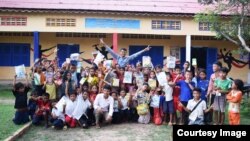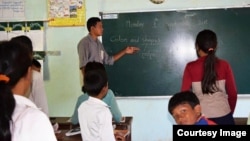[Editor’s Note: Oun Kosorl is the founder of Mother Home Cambodia, located in Tataok Kandal Village, Siem Reap province. Kosorl teaches Cambodian children for free, having founded the school in late 2014, aiming to provide opportunities for rural children to learn English. Mother Home Cambodia has taught more than 800 children since its founding, with about 200 current students. Kosorl has largely self-funded the school with money he makes as a tour guide. In 2015, Kosorl was invited to discuss his project at One Young World, the largest youth conference in the world, with more than 1,300 young leaders participating from around the world.]
Q: You are the founder of the Mother Home Cambodia, located in Chan Sar commune in Siem Reap province. Could you tell me about the current situation at your school?
Kosorl: I am a tour guide. I contribute my salary to develop the community. We teach children from 1 pm to 8 pm. We have different levels for our students. The first level is the English kindergarten. The school has only one building, built from wood and cement. We have a very simple school. We don’t have a modern school or state school standards. It is a school for the rural area.
Q: What motivated you to build and implement the English school project?
Kosorl: We like community education, especially in rural areas. I want children in rural areas to have the same opportunities to study English as urban children. English is a needed language to communicate internationally.
Q: How many students study at your school?
Kosorl: There are about 800 students who have studied or have been studying in my school. Some students started since they were in grade 5 or grade 6 until they were in grade 12. Before the school vacation this year, we had 270 students. Now we have only 200 because some students are going to high school, so they don't have time to study English with us.
Q: What is the situation of your community? How did it motivate you to build the school and implement the school project?
Kosorl: I built the school because I benefit from my English. I studied English in high school and university. I told myself that one day I would build a school to help my community to give the opportunity to young people to learn English. There are 12 villages in my commune and we have many young children. Before I implemented the school project, children were not able to speak English, and they didn't have a chance to speak English with foreigners.
Q: How did you recruit students?
Kosorl: We don’t have a clear administrative system due to a limited budget. The teacher and I register the students. For students aged between 4 to 6 years old, we require students to know how to write Khmer. That would facilitate the teacher and teaching process. If they can’t write Khmer, we don’t accept them into the class.
Q: What are the challenges that you experience when you operate the school project?
Kosorl: First, I face some challenges with the authority because they do not understand the value of education. Even though I submitted documents from the commune level, they still questioned us. Overall, I face difficulties in terms of the legality of my school. That is my biggest challenge. Second, the parents. They have limited knowledge of education so that they won't place much value on our work.
Q: What are you most proud of?
Kosorl: I noticed that children could communicate in English. Some students are even better than their teachers. I am so happy about that. When I would leave this world one day, I already helped many students to have a good future.
Q: Have you ever thought about giving up the project?
Kosorl: I have never been hopeless with students. I like to work with them. I am happy about that. I like children. There are two reasons that made me consider closing the school. First, it is because of the authorities. The second reason is the parents. However, parents open their minds to send their children to school nowadays. We have a hard time with the local authority, especially the police. When we have international volunteers, the police come around even though we already informed them. Sometimes, I gave them some money.
Q: Do you have any messages or final comments?
Kosorl: I have a message to the youth, especially young people who were born in the 1990s. If they have good careers, they should consider helping their community. So, young children can study. I hope young Cambodians are positive and selfless. I hope they will contribute to the development of children who can’t afford education.






